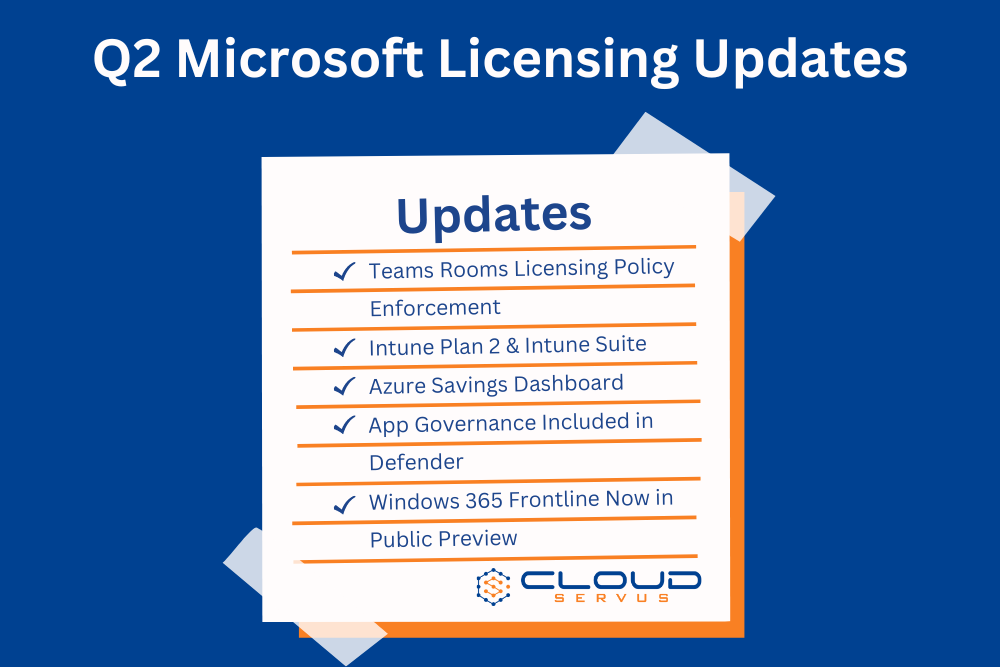New Year, New Microsoft Licensing Changes: Key Announcements You Need to Know for 2025
Microsoft regularly rolls out new products and licensing updates, and at CloudServus, we’re here to help you stay ahead. From newly released products...
4 min read
Dave Rowe Oct 17, 2024 11:59:04 AM

Microsoft regularly unveils exciting updates and announcements, and at CloudServus, we are dedicated to keeping you informed about the continuously evolving Microsoft product landscape and licensing requirements. This ensures your organization is well-prepared to manage any upcoming changes.
Let's explore the newest announcements from Microsoft regarding licenses and upcoming products.
Here are the key Microsoft updates from Q3 2024:
In August 2024, Microsoft introduced Frontline Worker licenses for Intune within the CSP. This offer includes Intune Plan 1, Intune Plan 2, Intune Suite, and individual components of the Intune Suite such as Intune Remote Help and Intune Advanced Analytics. The cost of these Frontline Worker Intune licenses are ~30% less when compared to non-Frontline Worker user subscription licenses. Frontline Worker products are specifically designed for employees who work in roles such as retail, healthcare, and manufacturing.
This update will help bring Intune device management and additional capabilities to organizations that employ Frontline Workers. To qualify for Frontline Worker licenses, users need to either be sharing devices (i.e. shift workers) with other licensed users or be using a primary work device with a screen smaller than 10.9”.
Microsoft announced last quarter that their new Microsoft Entra Suite is now generally available. This solution will help you secure employee access to any cloud or on-premises app or resource from wherever they are, all while ensuring minimal access privileges. It costs $12 per user per month and can be given to anyone who already has an Entra ID Plan 1 license, or any plan that includes it, like Microsoft 365 E3. There’s also an Add-on for users already licensed with Entra ID Plan 2.
Microsoft has introduced a service called Windows 365 Cross-region Disaster Recovery to ensure business continuity for Windows 365 users during regional outages. This feature, available as an add-on, takes "snapshots" of Cloud PCs and stores them in geographically distant locations defined by the customer. In the event of a disaster, these snapshots can be restored to Cloud PCs operating in the selected recovery location. This service is particularly valuable for industries and organizations with strict regulations or those requiring geographic separation between primary and backup sites.
The Windows 365 Cross Region Disaster Recovery Add-On license is exclusively available for Windows 365 Enterprise SKUs at a cost of $5 per user per month. You can view the announcement and an FAQ here. Additional details about this new service can also be found here.
Last month, Copilot Pages was introduced. It's a tool for organizing Copilot content and collaborating with colleagues. You can transform helpful Copilot responses into editable pages to share with your team. Starting today, Copilot Pages is available to Microsoft 365 Copilot users, and soon for all Microsoft 365 subscribers.
If you have a Microsoft 365 Copilot license, you and your team can work with Copilot directly on the page when you open it in full screen. In a multiplayer approach, prompt Copilot together as a team to improve and expand responses, learn from each other’s prompts, and organize complex information. With Copilot Pages, human to AI interactions come to life. We see collaborative prompting as the next great step forward in evolving Copilot from an individual, point-in-time exercise into a collaborative experience. Find the announcement details on Copilot Pages here. Watch Copilot Pages in action at https://youtu.be/oxxqw0E7Io8.
Last month, Microsoft announced that from October, customers with Microsoft 365 Business Basic, Standard, and Premium plans will be able to buy Microsoft 365 Copilot through the self-service option.
Administrators are able see who has licenses for self-service purchases in the Microsoft 365 Admin Center and have the option to block self-service purchases. You can find more details on that here.
From now on, administrators will need to use the Microsoft 365 Admin Center to assign licenses instead of the Entra Admin Center or the Azure Management Portal. This change aims to simplify the process of managing licenses within Microsoft's ecosystem. You can also assign licenses through PowerShell or Microsoft Graph by using the comprehensive guides provided on the Microsoft Learn website for both user and group license assignments. The audit logs remain unaffected, and you can continue to view all assigned licenses in the Microsoft Entra Admin Center.
Find more details about this change here.
Microsoft has announced that the next Exchange Server will be a Subscription Edition (SE), set to release early in Q3 of 2025. Similar to SharePoint Server SE, you’ll need active Software Assurance (SA) or subscription licenses to use it. If your SA expires, you’ll still have access to the 2019 version. To speed up in-place upgrades, Exchange Server SE will offer support for two upgrade types: in-place upgrade and legacy upgrade, in addition to being code equivalent.
In-place upgrade
The quickest and simplest method to transition from Exchange Server 2019 to Exchange Server SE is through an in-place upgrade. The process mirrors that of installing a CU. After a server is upgraded to Exchange Server SE, it will follow our regular update schedule of two cumulative updates annually, one in the first half of the year and another in the second.
Legacy upgrade
Exchange Server SE also allows for legacy upgrades, which include setting up new infrastructure and transferring namespaces and mailboxes. These methods are also applicable in situations like replacing server hardware or upgrading to a newer version of Windows Server, and they remain supported in Exchange Server SE. If your organization currently uses Exchange 2016 and plans to keep Exchange on-premises, you have one more upgrade to complete. We suggest upgrading from Exchange 2016 to Exchange 2019 soon, ensuring an easy transition to Exchange Server SE afterward.
Our consultants use their deep knowledge of Microsoft licensing to align your licenses with your business needs. By evaluating your programs, licenses, and pricing structures, we can identify improvement areas. Many clients don't realize that more affordable O365 plans could suit their needs or that customizing stand-alone licenses might save costs. On average, our optimization efforts have saved new customers up to 17%.
Contact CloudServus today for an assessment of your Microsoft licensing and a discussion about your goals. We are ready to help you explore your options.

Microsoft regularly rolls out new products and licensing updates, and at CloudServus, we’re here to help you stay ahead. From newly released products...

Since the beginning of their fiscal year in July, Microsoft has made several announcements. CloudServus is committed to keeping you well-informed...

CloudServus aims to ensure that you stay informed about the dynamic landscape of Microsoft products and licensing. Our objective is to keep you...